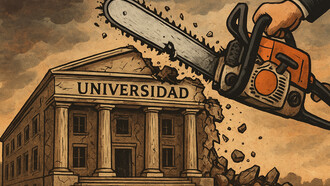Traditional definitions of diasporans, such as those of Safran, have emphasized the role of diasporans in the restoration of homes and their stability. What they mean, put in simple terms, is that a diasporic subject is concerned about home, keeps close contact with it despite living in the host nation, and feels responsible and obliged to contribute to home’s social, economic, and political progress. Thus, attachment to home, and close relationships are distinguishing markers of a diaspora. With increasing globalization and new migration patterns, the African diaspora is growing, becoming more complex and multifaceted, thereby probing the role of the diaspora in the home.
Over the last few weeks, Kenyans' have been demonstrating against punitive taxation, corruption, and state capture, and it is notable that the role of Kenyans in the diaspora has been significantly felt in the new movement. From hosting conversation spaces on X to contributing money and other resources to facilitate peaceful demonstrations, these Kenyans living outside the borders of their country have become key actors in this historic juncture that has the potential to transform the country for the better.
Nevertheless, their involvement and role have been met with criticism. As a Kenyan in the diaspora, I have listened to opinions and read comments on social networks that negate the role that we play in ‘restoration’ of home, and threaten to weaken the movement. The most notable critique has been that diasporans are gaslighting their compatriots, who end up being victims of police brutality and the use of excessive force; thus, their protest experiences are defined by injuries, death, abduction, and illegal detention by the state. On the other hand, diasporan protest experiences are typified by them ‘enjoying’ safety and freedom of speech abroad. There's an adage in my national language, Dho Luo, that describes a scenario where a wet piece of stick tells a dry stick, ‘Lets jump over the fire, for it is not very hot,’ aware that it is unlikely to burn. So the dry stick takes the jump and immediately catches fire. Kenyan compatriots at home see themselves as the dry stick while viewing the diasporans as the wet stick, suggesting a foul play or some sort of imbalance.
As a diasporan, being away from home presents you with freedom that you would otherwise lack while at home. It is this freedom that we use to make things better, albeit to compensate for the ongoing silencing of voices at home. When censorship is on the rise, our compatriots at home can rely on us to share and amplify their voices. Besides, with digital spaces creating a virtual world and society and extending borders, diasporans now feel more at home and connected than in the past. It is also important to note that the host communities and societies provide spaces for the foreigners to demonstrate or picket, and the Kenyan diasporic communities have utilised these spaces in the cosmopolitan West to make themselves visible and audible as they negotiate for a better home, away from home.
Being away from home, and with this, I mean distance, alters and intensifies our illumination of the problems that our country faces. Comparatively, we observe home vis-à-vis our host nations, and the differences and pitfalls of home become clear. This is an experience that those left behind lack. If we have become too critical of the government and regime, it is because we have seen what functional governments can do, and we only want the same for our home. We get envious of our host nations. The envy pushes us to moments of introspection, probing the status of home and asking where the rain started beating us. We begin to see clearly, taking off the shades of normalization and replacing them with new ones of contestation, and this marks the birth of our quest to improve the state of home.
This is what distance and absence do to us. It makes us active political agents, mobilizing our bodies and forces to make them count. As a diasporan, we are not privileged but operate within circumstantial luck that presents us some ideals like freedom, which we use to (re)build home. It would be problematic for us to sit back and watch when an inferno blazes at home, yet we have the intellectual, material, and other capacities to aid in extinguishing it. It is for this reason that I think our compatriots at home should go slow on us. We all want the best of home, and our existence in the Kenyan diaspora makes our duty to home complex but not complicated. Given a chance, we would all be at home united in the same quest. At any time, it should be remembered that to be a diasporan is akin to being unsettled when eating in another person’s consciousness of hunger and deprivation at home. It can never get comfortable. It dehumanizes the self, robbing the body of its dignity, and humanization is only possible with a commitment to ending this deprivation at home.















